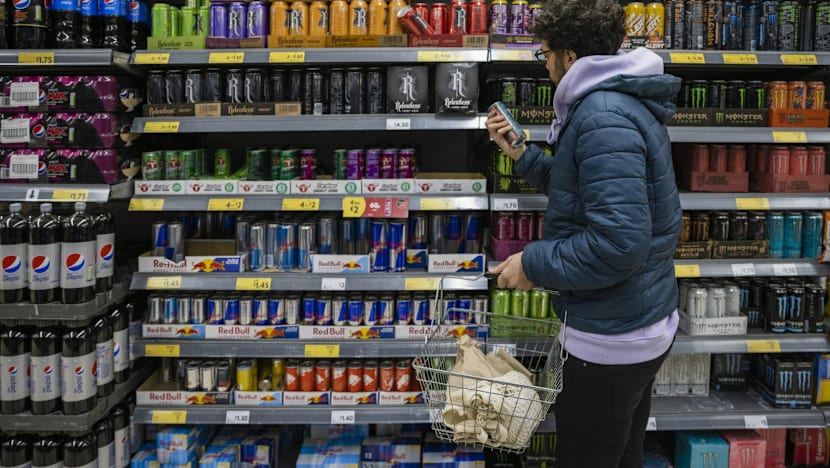UK looks to ban sale of high-caffeine energy drinks to under-16s
The UK government said there was evidence linking high-caffeine energy drinks to a child's mental health, sleep quality and academic performance.

A shopper browses energy drinks at a grocery store. (File photo: iStock)

This audio is generated by an AI tool.
The UK government has proposed banning the sale of high-caffeine energy drinks to youths under 16 years of age in shops, restaurants, cafes and vending machines, as well as via online retailers.
According to a press release issued by the government on Tuesday (Sep 2), the UK will consult on banning the products for the age group "due to negative impacts on children's physical and mental health".
The proposal will make it illegal to sell high-caffeine energy drinks containing more than 150mg of caffeine per litre to anyone under 16.
Under current rules, any drink with over 150mg of caffeine per litre requires a warning label saying it is not recommended for children.
Examples of high-caffeine energy drink brands include Monster, Red Bull, Prime and C4. A 500ml can of Monster contains about 160mg of caffeine, while Red Bull, which typically comes in a 250ml can, has 80mg.
Lower-caffeine soft drinks, tea and coffee are excluded from the ban.
"There is growing evidence linking these drinks to harmful effects on children, including disrupted sleep, increased anxiety, poor concentration and reduced educational outcomes," the Department of Health and Social Care said.
The UK government said that parents and teachers back the proposed ban, which "will deliver significant long-term health benefits".
This move could prevent obesity in up to 40,000 children, it said, adding that around 100,000 children in the UK consume at least one high-caffeine energy drink daily.
Many major retailers already voluntarily restrict the sale of such drinks to children, but some smaller convenience stores may still be selling them to children. This highlights "the need for a consistent approach", the UK government said.
A consultation launched on Tuesday will run for 12 weeks and seek input from health experts, education leaders, retailers, manufacturers, local enforcement authorities and the public.
Health and Social Care Secretary Wes Streeting said: "By preventing shops from selling these drinks to kids, we’re helping build the foundations for healthier and happier generations to come."
He added that the government is shifting its course of action from treatment to prevention and "acting on the concerns of parents and teachers and tackling the root causes of poor health and educational attainment head-on".
The press release mentioned that up to a third of children in the UK aged 13 to 16 years, and nearly a quarter of children aged 11 to 12 years, consume one or more high-caffeine energy drinks each week.
"Acting now to improve children’s wellbeing will not only help give them the best start in life and prevent them from a lifetime of poor health," said the Department of Health and Social Care.
Experts also backed the ban.
Professor of public health nutrition at Teesside University Amelia Lake said: "Research has shown the significant mental and physical health consequences of children drinking energy drinks ... and have shown that these drinks have no place in the diets of children."
Banning the sale of the products to youths is "the next logical step" in improving the diet of children in the UK, said Prof Steve Turner, president of the Royal College of Paediatrics and Child Health.
"Paediatricians are very clear that children or teenagers do not need energy drinks," he added.
"Young people get their energy from sleep, a healthy balanced diet, regular exercise and meaningful connection with family and friends."
















